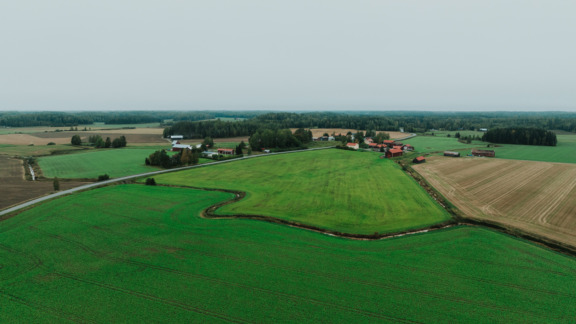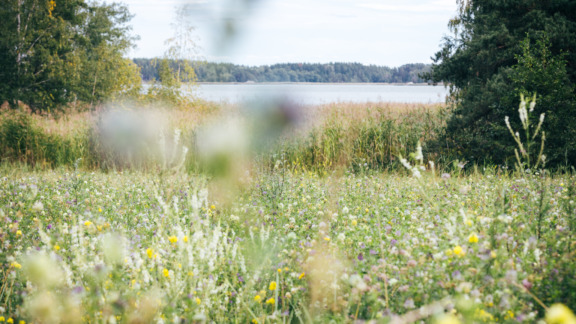Blog: “Aim high and work together” – Carbon Action at “4 per 1000” Day in Glasgow
by Laura Höijer, content director, BSAG
How is soil carbon sequestration being promoted in different countries? The “4 per 1000” Initiative Day in connection to COP26 provided a trip around the world in over 40 presentations. Real momentum is building, and the day also provided some much-needed opportunities for networking and building future collaboration.
Though the outcome of the climate change conference COP26 in Glasgow left quite a bit to be desired, Baltic Sea Action Group (BSAG) participated in a very encouraging “4 per 1000” Initiative Day in connection to the conference. Over 40 presentations from around the world brought forth a lot of promising practical action and co-operation to increase soil carbon sequestration.
The general theme of the day was the mobilization of actors through multi-stakeholder coalitions for the implementation of the 2050 Strategic Plan. The day was organized as a hybrid event.
The global “4 per 1000” initiative, presented by France at Paris Climate Summit 2015, demonstrates that agriculture, and in particular agricultural soils, can play a crucial role in mitigating climate change and improving food security. An annual growth rate of 0.4% in the soil carbon stocks, or 4‰ per year, in the first 30–40 cm of soil, would significantly reduce the CO2 concentration in the atmosphere.

Finnish contribution to the initiative
In my speech, I stressed that Finland, one of the first signatories, is strongly promoting the “4 per 1000” Initiative. An important tool is the “Catch the Carbon” climate action package. BSAG is also a member of the “4 per 1000” consortium, and as an example of action done in Finland, I presented our Carbon Action platform that is promoting regenerative agriculture in wide collaboration.
100 Carbon Action farmers work closely with us and play a crucial role in the research. Over 1 000 farmers also participate via the Carbon Action club and many study regenerative agriculture on our comprehensive online course.
11 companies are doing concrete work such as training contract farmers. The first products have also been launched: the world’s first regeneratively produced vodka and a carbon farmed Christmas beer. We work closely with decision-makers at different levels and are piloting voluntary carbon farming markets.
Dr. Laura Höijer, excited to hear presentations.
Strong multidisciplinary research is carried out, for example, a verification system is being created. Soil carbon balance can already be followed in real-time through Field observatory, which also has the world’s first forecast on carbon sequestration.
BSAG’s Elisa Vainio, in her talk, announced the 1st Northern Europe “4 per 1000” Regional Meeting in Helsinki 6–8 June, 2023. In addition to “4 per 1000” and BSAG, this event is funded by the “Catch the Carbon” programme (Finnish Ministry of Agriculture and Forestry) and EIT-FOOD. Please visit the webpage and join us in collaboration.

Opportunities for future collaboration
Vice-President of the “4 per 1000” Initiative, Ms. Gabrielle Bastien, Founder and Director of Regeneration Canada, emphasized in her opening, that soil plays a huge role in reaching carbon neutral societies. She also stressed that sustainable action is not enough, we need regenerative action. It is easy to agree with her!
One of the highlights for me was – after a long break – to meet people in person, network, and plan concrete co-operation. In our discussions with Gabrielle, we realised that BSAG’s Carbon Action and Regeneration Canada are promoting very similar issues and work in similar ways. This offers a good basis for future collaboration.
In her speech, Ms. Pippa Hackett, Minister of State for Agriculture in Ireland, told the audience about the concrete work done in promoting carbon farming both in mineral and peat soils in Ireland. Ireland has launched Soil Sampling and Analysis Programme, that aims at putting soil carbon, soil health and fertility at the very centre of the future agricultural model.
One benefit of BSAG’s trip to Glasgow was the opportunity to discuss peat soils with different countries, such as Ireland and Scotland, where we see very similar problems and possibilities for solutions. Peat soils will be one of the topics of the Northern Europe ”4 per 1000” Regional Meeting in Helsinki in 2023, offering a great possibility for further collaboration on the topic.
Inspirational speeches set the tone
Prof. Rattan Lal, Distinguished University Professor of Soil Science, Ohio State University and Ms. Leigh Ann Winowiecki, Soil Systems Scientist, CIFOR-ICRAF, gave excellent inspirational presentations. Lal’s soil mantra concluded his talk well and sums up what we’re trying to achieve: ”Healthy Soil = Healthy Diet = Healthy People = Healthy Ecosystems = Healthy Planetary Processes”.
“Healthy Soil = Healthy Diet = Healthy People = Healthy Ecosystems = Healthy Planetary Processes” – Professor Rattan Lal
Ms. Winowiecki told the “4 per 1000” audience about the new Coalition of Action 4 Soil Health (CA4SH) which was established at the Food Systems Summit 2021. The coalition aims to improve soil health globally by addressing critical implementation, monitoring, policy, and public and private investment barriers that constrain farmers from adopting and scaling up healthy soil practices. We at BSAG and Carbon Action find the coalition very interesting for our work.
Ms Winowiecki ended her presentation with the wise words of Michelangelo: “The greatest danger for most of us is not that our aim is too high, and we miss it, but that it is too low, and we reach it”. We can relate to this – in our Carbon Action work, the aim has always been very high!
Concrete work on multiple levels
Some Members and Partners of the “4 per 1000” Initiative had the opportunity to briefly present how they are working to increase soil carbon sequestration. The Members and Partners amount to a diverse and abounding global network, representing different approaches, working in different sectors and on many different levels – from grassroots to policy and other types of steering.
Mr. Philippe Mauguin, CEO, INRAE gave a very concrete example on reaching the customers in the soil health work: a Low Carbon product label. The intention behind this label is to encourage projects that feature voluntary reduction of GHG emissions and soil and biomass carbon sequestration. There is a need for similar kind of label in Finland, too, and this is very useful information for those working towards it. Mr Mauguin also told us about the new important European Mission related to soil: A Soil Deal for Europe – something to boost in Finland also.
The recently launched EU Soil Observatory (EUSO) was presented by Mr. Stephen Quest, Director General, JRC. In the future, the EUSO aims to become an inclusive platform that supports policymaking as well as EU research and innovation on soils. In addition, it very importantly raises societal awareness of the value of soils.
“The greatest danger for most of us is not that our aim is too high, and we miss it, but that it is too low, and we reach it”. – Ms. Leigh Ann Winowiecki quoting Michelangelo
Mr. Nkulumo Zinyengere, Agricultural Specialist, said that the World Bank has embedded soils in their climate change plan, they have a strong focus on impact, and they are working with their country teams to develop and promote protocols. He emphasized that we need to attract investment, we need approaches to measure and monitor soil carbon (but they are expensive), and we need to convince farmers and land managers to adopt soil health enhancing measures. We must overcome barriers such as technical challenges.
All farmers can contribute even though soils differ across different areas, Mr. Gérard Rass, Secretary General, APAD told us. Mr Rass described how carbon sequestration for soil health can be taken from scientific concept to massive implementation by farmers. He emphasized that a simple system of certification or verification is needed – to make carbon offsetting favourable to farmers.
Mrs. Karen Ross, State Secretary for Agriculture, CDFA, presented the Healthy Soils Program which provides financial incentives to California growers and ranchers to implement conservation management practices that sequester carbon, reduce atmospheric greenhouse gases, and improve soil health. Concluding her presentation, she reminded us: ’If you want to go fast, go alone, if you want to go far, go together’. We fully agree – the most central key to success in our Carbon Action work is co-operation.

The “4 per 1000” Initiative Day was packed with presentations of many other interesting initiatives and programmes. Ms. Carmen Munoz-Dormoy, President of Planet A®, told us that the momentum is ideal for a positive agricultural revolution. Mr. André Leu, International Director, presented Regeneration International, that aims to accelerate the global transition to regenerative food, farming and land management. Mr. Axel Reinaud, co-Founder and President, that the basis of NetZero’s soil work is biochar.
The future of the “4 per 1000” Initiative
In Glasgow, the “4 per 1000” Initiative also grew. Scotland will join the initiative, Ms. Mairi Gougeon, Cabinet Secretary for Rural Affairs and the Islands, announced. Ms. Gougeon’s vision for the future of Scottish agriculture is a positive one – she wants to make Scotland a world leader in sustainable and regenerative agriculture by transforming how farming and food production is supported.
It was concluded that the goals of the Strategic plan of the “4 per 1000” Initiative are more relevant than ever for this unique multi-stakeholder partnership in the field of food security and climate change, that brings together nearly 650 members and partners (countries, international organizations, research and educational institutions, agricultural and forestry producers, non-governmental organizations, businesses, etc).

The Implementation Plan of the Strategic Plan has been created in collaboration with the members, partners and supporters and it was adopted during the “4 per 1000” Day. BSAG, together with the Ministry of Agriculture and Forestry, has actively contributed to the process so far – and continues to do so in the important implementation phase. One concrete example is organizing the Northern Europe “4 per 1000” Regional Meeting in Helsinki in 2023.
For more information:
The stream of the “4 per 1000” Day will be uploaded here: https://4p1000day2021.sciencesconf.org/



